#eunice westmoreland
Photo


Dona Drake was a African actress, dancer and singer. However, Hollywood had know idea that she was African. In my research, I came across an article which gives more detail regarding Drake’s story.
“Dona Drake was a African actress, singer, and dancer who was famous in the 30s, 40s, and 50s. However, publicly, her fans would not learn of her African ancestry until years later after studio publicity inaccurately claimed that she was born Rita Novella in 1920 in Mexico City, giving the impression that she was of Mexican heritage. In actual fact, she was born November 15, 1914 in Florida to Joseph Westmoreland (of Arkansas) and Novella Smith (of Alabama) and they named her Eunice Westmoreland. U.S Census reports of her family history show her grandparents were one African couple and one couple that was African/European. Because of her features and dark curly hair, film makers often cast her when they needed to fill the role of an ethnic character that looked native, gypsy, or middle eastern.”

150 notes
·
View notes
Text
D.U.D.E Bios: Mike Mann / 'Monster' Mike
N.P.R's Drummer 'Monster' Mike (2020)
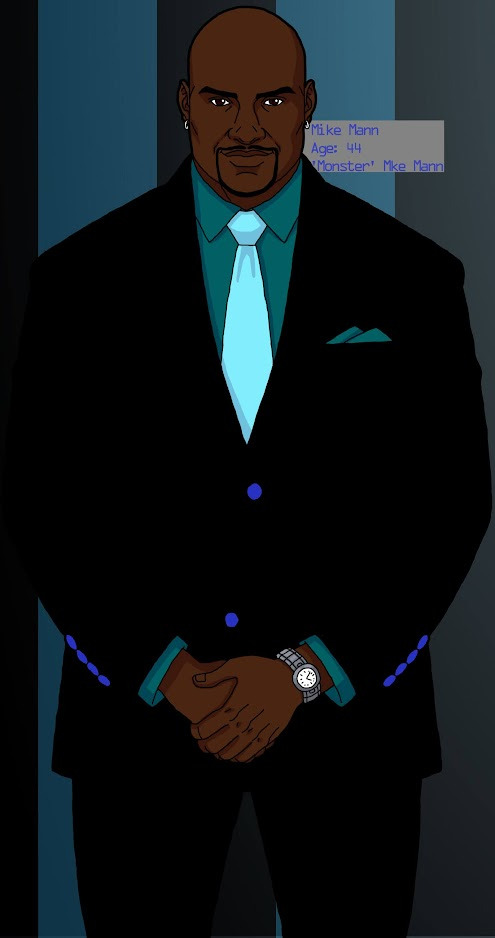
One of Kirby's old stable-mates, and her closest friend other than Angelica St John, Mike Mann is the drummer for the wrestling stable/band 'Native Pride Regime'. Mike is a black, specifically Jamaican, wrestler and was trained by Kirby and her family, being the first person in his family to become a wrestler.
"I don't rap, that's J.P's business."
Name
Full Legal Name: Mike Dariel Mann
First Name: Mike
Meaning: Short form of 'Michael', which comes from the Hebrew name 'Mikaha'el' meaning 'who is like God?'
Pronunciation: MIEK
Origin: English
Middle Name: Dariel
Meaning: Probably an elaborated form of 'Darrel' (which comes from an English surname that was derived from Norman French 'd'Airelle', originally denoting one who came from Airelle in France), with an ending similar to biblical names such as Daniel
Pronunciation: DAR-ee-ehl
Origin: English-Spanish
Surname: Mann
Meaning: From a nickname meaning 'Man'
Pronunciation: MAN
Origin: German, English
Alias: 'Monster' Mike Mann, 'Monster' Mike
Reason: Ring Name
Nicknames: Mikey
Titles: Mr
Characteristics
Age: 44
Gender: Male. He/Him Pronouns
Race: Human
Nationality: Jamaican
Ethnicity: Black
Birth Date: April 6th 1976
Symbols: Drums, Drumsticks, Claw Marks, Blood
Sexuality: Heterosexual
Religion: (Protestant) Christian
Native Language: English
Spoken Languages: English, Spanish
Relationship Status: Single
Astrological Sign: Aries
Theme Song: 'Rock the House' - Gorillaz (2001-)
Voice Actor: Danny John-Jules
Geographical Characteristics
Birthplace: Savanna-la-Mar, Westmoreland Parish, Jamaica
Current Location: On the road / Llanfaethlu, Anglesey, Wales / Savanna-la-Mar, Westmoreland Parish, Jamaica
Hometown: Savanna-la-Mar, Westmoreland Parish, Jamaica
Appearance
Height: 5'7" / 170 cm
Weight: 300 lbs / 136 kg
Eye Colour: Brown
Hair Colour: Black
Hair Dye: N/A
Body Hair: Shaves when wrestling
Facial Hair: Goatee
Tattoos: (As of Jan 2020) 9
Piercings: Ear Lobe (both)
Scars: None
Health and Fitness
Allergies: None
Alcoholic, Smoker, Drug User: Social Drinker, Smokes Cigars
Illnesses/Disorders: Type 1 Diabetes
Medications: Insulin
Any Specific Diet: None
Relationships
Allies: Ash Thunder, Sakurako
Enemies: None
Friends: Jacob 'J.P' Papadopoulous, Ashkii Tsinajinnie, Yoshi Nakagawa, Tristan Lum, Xavier Ibarra, Ardalion Volkov, Patrick Turner, Conan Pritchard, Lochlainn Rhydderch
Colleagues: Too many to list
Rivals: 'Homicide' Nelson Erazo, 'Blackjack' Jack Marciano
Closest Confidant: Altagracia Mann
Mentor(s): Naoise Rhydderch, Moses Mann
Significant Other: None
Previous Partners: None of Note
Parents: Moses Mann (64, Father), Altagracia Mann (65, Mother, Née Nash)
Parents-In-Law: None
Siblings: Adah Pond (41, Sister, Née Mann), Luke Mann (38, Brother), Beulah Rush (35, Sister, Née Mann), Kenan Mann (32, Brother), Cozbi Teel (29, Sister, Née Mann), Jethro Mann (26, Brother)
Siblings-In-Law: Ichabod Pond (42, Adah's Husband), Dinah Mann (39, Luke's Wife, Née Vann), Hiram Rush (36, Beulah's Husband), Eunice Mann (33, Kenan's Wife, Née Wild), Gideon Teel (30, Cozbi's Husband), Hannah Mann (27, Jethro's Wife, Née York)
Nieces & Nephews: Felix Pond (21, Nephew), Ivah Pond (22, Felix's Wife, Née Blue), Joanna Pond (18, Niece), Elijah Pond (15, Nephew), Keziah Pond (12, Niece), Darius Pond (9, Nephew), Leah Pond (6, Niece), Cyrus Pond (3, Nephew), Martha Mann (18, Niece), Bartholomew Mann (15, Nephew), Abigail Mann (12, Niece), Amos Mann (9, Nephew), Bernice Mann (6, Niece), Malachi Mann (3, Nephew), Claudia Rush (15, Niece), Lucius Rush (12, Nephew), Deborah Rush (9, Niece), Kenaniah Rush (6, Nephew), Edna Rush (3, Niece), Jesse Mann (12, Nephew) Hosanna Mann (9, Niece), Isaiah Mann (6, Nephew), Iscah Mann (3, Niece), Hazael Teel (9, Nephew), Julia Teel (6, Niece), Gera Teel (3, Nephew), Milcah Mann (6, Niece), Festus Mann (3, Nephew)
Children: None
Children-In-Law: None
Grandkids: None
Great Grandkids: None
Wrestling
Billed From: The Island of Jamaica
Trainer: The C.R.C Wrestling School
Managers: Kirby Rhydderch
Wrestlers Managed: None
Debut: 2001
Debut Match: 'Monster' Mike Mann VS Naoise Rhydderch. Mike won by DQ
Retired: N/A
Retirement Match: N/A
Wrestling Style: Brawler / Hardcore
Stables: Native Pride Regime (2006-)
Teams: Native Pride Regime (Monster Mike & A.T / Sakurako / Kirby)
Regular Moves: Asian Mist, Big Boot, Gorilla Press into Flapjack, Overhead Belly to Belly Suplex, Powerbomb, Running Corner Body Avalanche, Spear, Twisting Chinlock
Finishers: Powerslam, Backbreaker, Chokebomb, Sidewalk Slam, Splash
Refers To Fans As: The Audience
Extras
Backstory: Born in Jamaica and coming to C.R.C for training at the age of 20 in 1996. Mike Mann is a foolish man who believes some things in life are owed to him, like Kirby's hand in marriage, so he fakes like he's happy being her friend and never being allowed to do more than kiss her as a celebration of tough fought victories. Mike is the first person of his family to become a wrestler, falling head over heels in love with Kirby (a woman who does not want a relationship with him, ever) in the process.
Trivia:
Mike has known Kirby since she was 10 (He was 25 at the time they met).
Mike has purposefully stayed single in the hopes of one day dating Kirby.
He let Kirby move in with him, hoping it would lead to a relationship.
The night Mike kicked Kirby out, he was going to confess his love to her.
#D.U.D.E#original character#Mann#C.R.C Wrestling School#C.R.C Wrestling Promotion#N.P.R/Native Pride Regime
4 notes
·
View notes
Text





A fascinating tale of real-life “passing” can be found in the life story of Dona Drake (nee Eunice Westmoreland), a Black, Florida-born actress, singer, dancer, and bandleader who passed for the entirety of her career. Though both parents were of Black ancestry, studio publicity declared Drake (who went by the names Una Villon, Rita Novella, Rita Shaw, and Rita Rio at various stages of her career) hailed from Mexico and was of French/Irish extraction. The beautiful and vivacious performer went on to be cast as "exotics" in a number of films throughout the '40s and '50s, principally as a musical-comedy performer.
Another level of "passing" was added to Don Drake’s already fabricated biography when in 1940 she wed gay costume designer William Travilla (Oscar and Emmy winning designer for "Valley of the Dolls" and Marilyn Monroe's favorite designer) in what is believed to have been a mutually-beneficial, studio-arranged marriage.
Excerpt from the film essay on Rebecca Hall's "PASSING" (2021)
#dona drake#william travilla#travilla#passing#Hollywood#classic hollywood#racism#identity#valley of the dolls#strike me pink#secrets#nella larsen#rebecca hall
26 notes
·
View notes
Text
Photo Spotlight on Dona Drake
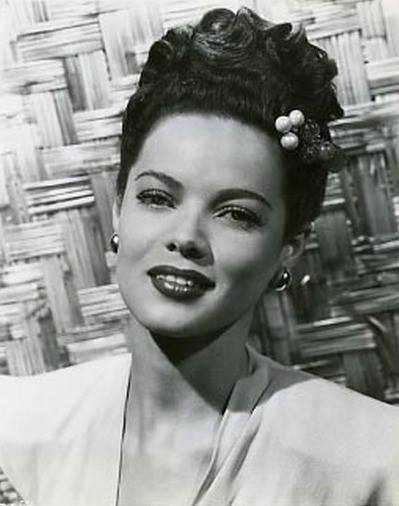



I've been recently learning about a classic entertainer from the 1930s and ‘40s, Dona Drake. Born a woman of African and European heritage called Eunice in Florida of 1914, Dona Drake was a captivating talent and woman who had a unique old Hollywood career because of the intersections of race, color and opportunity (as well as the lack of them) amidst the old studio system.
(Eunice Westmoreland)
is born in Miami, Florida, one of five children of Joseph Andrew Westmoreland of Arkansas and his wife, Novella Smith of Alabama. Her parents are of African American descent. Studio publicity will later claim she was born in Mexico City in 1920.
(Source: Glamour Girls of the Silver Screen)
Life was good for most of Jacksonville’s residents, but not for the Westmorelands, as segregation was strictly enforced and though Dona claimed Latin heritage throughout her personal and professional career, Eunice Westmoreland was negro. Referred to as such in both 1920 and 1930 census records. Both parents were interchangeably referred to as negro and mulatto in the early 1900 censuses.
(Source: TRAVILLA'S LEGACY)
On her own, Dona did a few short films and two-reelers, sang on the airwaves and revved up her image signing on radio. Good friend Dorothy Lamour assisted in getting her signed up to Paramount, where the studio changed her name to "Dona Drake" and built up her Latino background by sending out studio resumes that she was christened Rita Novella, was of Mexican, Irish and French descent and born and raised in Mexico City. Dona's first picture for the studio was in the Dorothy Lamour vehicle Aloma of the South Seas (1941). She then pepped up the Bob Hope starrer Louisiana Purchase (1941) as well as an Arab girl in the Hope/Crosby/Lamour comedy Road to Morocco (1942). Unable to break out of her typecasting as a spicy singing support, her contract was dropped after a sparkling big band singing lead loanout to Monogram entitled Hot Rhythm (1944). Around this time she married the Oscar- and Emmy-winning costume designer William Travilla.
(Source: IMDB)
Drake became an entertainer during a time where there were few chances for women of color beyond stereotype, particularly difficult for those who fell in the racial middle and challenged preconceived notions of Blackness (I touched about this in posts I wrote on other ambiguous actresses of color, Fredi Washington and Nina Mae McKinney).
Dona Drake went through a reinvention of her public identity and screen persona, her original background kept quiet in the attempt to pursue her ambitions, similar to the unfair pressures the lovely Anglo-Indian actress Merle Oberon went through in her own career.
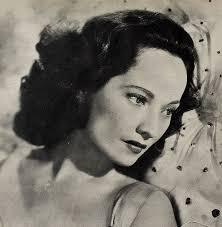
Taking advantage of the blur between racial lines in her heritage, Dona Drake played a variety of roles ranging from Indian to Arab and many more non-white (but non-Black) heritages.

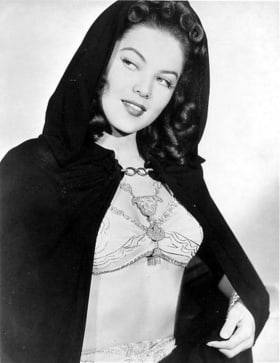
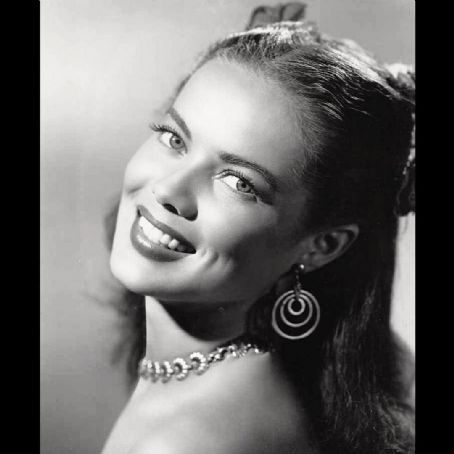
In 1949, she was spotlighted in the Bette Davis noir classic flick Beyond the Forest, as a Native American.


Reading about her life, it becomes clear that despite the stress and difficulties she must’ve encountered regarding the burdens of racism in the film world, it did nothing to dull her exuberance. Watching some videos of Drake shows what an exciting performer she was! A triple threat, singer/actress/dancer, she grabs the viewer's attention the moment she leaps onscreen and sparkles like the star she should've become.
It strikes me how she, like other ambiguous performers of color in this era, were veritably brimming with talent and exceptional skill but constantly had the problem of battling stereotypes and typecasting because of there being such a stark divide between the representation of Blackness and Whiteness onscreen. To be blunt, there simply was very little room for any sort of 'middle-ground' for these performers because of the image Hollywood presented of people of color in comparison to White entertainers.
I definitely want to learn more about her work and probably write a much more detailed blog post on her at some point in the future, examining some of her films. As a film buff and mixed heritage woman of African-American descent myself, these types of intruiging, rarely told Hollywood stories genuinely fascinate me...how many more of these silver screen performers we look at in these old films are part of our community? How many more were talents who little girls of color, both black and mixed-race, could've looked up to and been inspired by over the decades if only Hollywood and society in general had been more just and equal in their appreciation of talented performers of all backgrounds? One can only wonder.
youtube
youtube
youtube
#Divas Damsels & Smudged Mascara#classic film#classic movies#old movies#classic hollywood#women of color#old hollywood#Golden Era of Film#classic actresses#classic actresses of color#black actresses#classic black actresses#Mixed-Race women#mixed-race#mixed-race performers#women in film#black women in film#film history#African American history#Dona Drake#starlets#musicals#bandleaders#all-girl bands#1940s#1930s#wwii era#vintage glamour#talented women
15 notes
·
View notes
Text

Dona Drake (born Eunice Westmoreland; November 15, 1914 – June 20, 1989) was an American singer, dancer and film actress in the 1930s and 1940s. Of three-quarters black heritage, she presented herself as Mexican and went by the names Una Novella and Rita Novella, typically being cast in "ethnic" roles including Hispanics and Middle Easterners, though occasionally took the role of white characters. As Mexican "Rita Rio", she led a touring all-girl orchestra in the early 1940s, also known as "Dona Drake and her Girl Band", among other names for her musical and dance acts.
Drake was born Eunice Westmoreland in Miami, Florida in 1914, one of five children of Joseph Westmoreland and his wife, Novella (née Smith). U.S. Census reports on her family history show her grandparents were one black couple and one couple that was black/white.
Entering show business in the 1930s, she used the names Una Velon (or Una Villon), Rita Rio and Rita Shaw.
She began performing in 1932, working under the name Una Villon as a chorus girl and in nightclubs. As Una Villon, she appeared in Earl Carroll's Vanities in 1933, prompting Paul Harrison to write in a review printed in The Indiana Gazette: "Most noteworthy newcomer is Miss Una Villon who sings, dances and looks like a 16-year-old incarnation of Ann Pennington. Only a couple of days before the premiere she was hired away from a Broadway night club and already has proved her right to a place in the big-time spotlight."
In 1934, columnist Walter Winchell wrote about her performance in a night club: "Una Villon's torso shifting serves to synchronize the tempos instead of Berren's directing — this young lady directs the tooters with her wiggling."
She began using the name Rita Rio in 1935, when she was featured at the Paradise cabaret on Broadway. Besides singing and dancing, she sometimes played piano, trumpet, clarinet, saxophone and drums and occasionally led the orchestra. In 1936, she and another woman formed an orchestra. After the group had financial problems in 1940, she went to Hollywood, where she had screen tests using the name Rita Shaw.
She settled on the stage name Dona Drake in the early 1940s. Studio publicity during her heyday incorrectly stated that Drake was of Mexican origin and was born Rita Novella (borrowing her mother's first name as a new last).
Her striking, angular features and dark curly hair led her to being cast as an ethnic character, such as a Latina, Middle Easterner, American Indian, or Gypsy. She is perhaps best known for playing the American Indian maid of Bette Davis in Beyond the Forest. She also appeared as the Arab girl Mihirmah, opposite Bob Hope and Bing Crosby in Road to Morocco in 1942. In 1944 she appeared as a lead role as a big band singer in a B-movie titled Hot Rhythm, which also featured Irene Ryan (Granny from The Beverly Hillbillies) as a ditsy secretary.
Drake had a notable "non-ethnic", non-musical role as the second female lead in the 1949 comedy The Girl from Jones Beach, playing opposite Eddie Bracken. The year before, she gave a memorable comic performance as the fortune-hunting sister in So This Is New York.
In the early 1940s, Drake toured the United States with an all-girl orchestra called "The Girl Friends", which included fellow Hollywood actresses Marie Wilson, Toby Wing, and Faith Bacon.
In 1936, Drake was questioned by the FBI about the murder of her then-boyfriend and known mobster, Louis Amberg. She claimed to only know him as "Mr. Cohen" and had no idea what he did for a living.
Drake married Oscar and Emmy award-winning fashion designer William Travilla on August 19, 1944. They had one daughter, Nia (August 16, 1951 – October 1, 2002), and remained a couple until her death. Travilla appeared on the March 24, 1960, episode of You Bet Your Life, hosted by Groucho Marx, and introduced his elegantly dressed wife to the audience.
Drake died of pneumonia and respiratory failure in Los Angeles, California on June 20, 1989, at the age of 74. She was cremated and her ashes scattered at sea.
5 notes
·
View notes
Text

Dona Drake (born Eunice Westmoreland; November 15, 1914 – June 20, 1989) was an American singer, dancer and film actress in the 1930s and 1940s. Of three-quarters black heritage, she presented herself as Mexican and went by the names Una Novella and Rita Novella, typically being cast in "ethnic" roles including Hispanics and Middle Easterners, though occasionally took the role of white characters. As Mexican "Rita Rio", she led a touring all-girl orchestra in the early 1940s, also known as "Dona Drake and her Girl Band", among other names for her musical and dance acts.
Drake was born Eunice Westmoreland in Miami, Florida in 1914, one of five children of Joseph Westmoreland and his wife, Novella. U.S. Census reports on her family history show her grandparents were one black couple and one couple that was black/white.
Entering show business in the 1930s, she used the names Una Velon (or Una Villon), Rita Rio and Rita Shaw.
She began performing in 1932, working under the name Una Villon as a chorus girl and in nightclubs. As Una Villon, she appeared in Earl Carroll's Vanities in 1933, prompting Paul Harrison to write in a review printed in The Indiana Gazette: "Most noteworthy newcomer is Miss Una Villon who sings, dances and looks like a 16-year-old incarnation of Ann Pennington. Only a couple of days before the premiere she was hired away from a Broadway night club and already has proved her right to a place in the big-time spotlight."
In 1934, columnist Walter Winchell wrote about her performance in a night club: "Una Villon's torso shifting serves to synchronize the tempos instead of Berren's directing — this young lady directs the tooters with her wiggling."
She began using the name Rita Rio in 1935, when she was featured at the Paradise cabaret on Broadway. Besides singing and dancing, she sometimes played piano, trumpet, clarinet, saxophone and drums and occasionally led the orchestra. In 1936, she and another woman formed an orchestra. After the group had financial problems in 1940, she went to Hollywood, where she had screen tests using the name Rita Shaw.
She settled on the stage name Dona Drake in the early 1940s. Studio publicity during her heyday incorrectly stated that Drake was of Mexican origin and was born Rita Novella (borrowing her mother's first name as a new last).
Her striking, angular features and dark curly hair led her to being cast as an ethnic character, such as a Latina, Middle Easterner, American Indian, or Gypsy. She is perhaps best known for playing the American Indian maid of Bette Davis in Beyond the Forest. She also appeared as the Arab girl Mihirmah, opposite Bob Hope and Bing Crosby in Road to Morocco in 1942. In 1944 she appeared as a lead role as a big band singer in a B-movie titled Hot Rhythm, which also featured Irene Ryan (Granny from The Beverly Hillbillies) as a ditsy secretary.
Drake had a notable "non-ethnic", non-musical role as the second female lead in the 1949 comedy The Girl from Jones Beach, playing opposite Eddie Bracken. The year before, she gave a memorable comic performance as the fortune-hunting sister in So This Is New York.
In the early 1940s, Drake toured the United States with an all-girl orchestra called "The Girl Friends", which included fellow Hollywood actresses Marie Wilson, Toby Wing, and Faith Bacon.
In 1936, Drake was questioned by the FBI about the murder of her then-boyfriend and known mobster, Louis Amberg. She claimed to only know him as "Mr. Cohen" and had no idea what he did for a living.
Drake married Oscar and Emmy award-winning fashion designer William Travilla on August 19, 1944. They had one daughter, Nia (August 16, 1951 – October 1, 2002), and remained a couple until her death. Travilla appeared on the March 24, 1960, episode of You Bet Your Life, hosted by Groucho Marx, and introduced his elegantly dressed wife to the audience.
Drake died of pneumonia and respiratory failure in Los Angeles, California on June 20, 1989, at the age of 74. She was cremated and her ashes scattered at sea.
2 notes
·
View notes
Text
Dona Drake: From Chorine to Chameleon
Dona Drake: From Chorine to Chameleon
The fascinating career of Dona Drake(Eunice Westmoreland, 1914-1989) is a story of resourceful subterfuge and a talent so great that no such misdirection should have been required at all. Drake was three-quarters African American, yet she generally gave out that she was of Mexican parentage in hopes that it would help her leverage white roles. Instead, she was more often cast as Latinas, Native…
View On WordPress
#actress#African American#bandleader#Dona Drake#film#films#Hollywood#Latina#Mexican#movie#movies#passing#Rita Rio#singer#star#Una Villon
0 notes
Photo




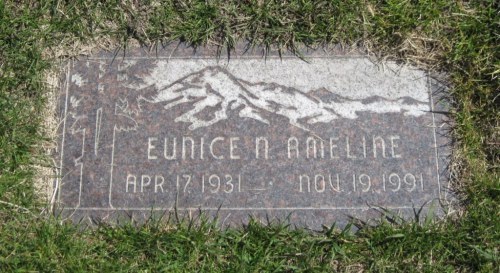
Donald Ameline 78
Birth: Aug. 23, 1929,
Death: Aug. 19, 2008
Great Falls
Cascade County Montana, USA
Donald Ameline, 78, of Great Falls, a truck driver and Army veteran, died of natural causes Tuesday Aug 19, 2008 at his home.
Survivors include six children,
John (Carol) Silversmith,
Greg Ameline,
Marvin Ameline,
Ron (Jody) Ameline,
Scott (Rhonda) Ameline
and Lisa (Larry) Hill, all of Great Falls;
stepchildren
Malinda (Red) Schmidt,
Rick Sullivan,
James Sullivan,
Jason (Rebekah) Westmoreland,
Donna Braulik,
David (Sherrie) Sullivan
and Donna G. Westmoreland;
brothers Oliver Ameline of Billings and Freddie Ameline of Sheridan, Ore.;
34 grandchildren and 15 great-grandchildren; and last, but not least, his Bichon, Maggie May.
Donald was very close to all 34 of his grandchildren, especially
Louie Ameline, Nick Maronick, Amanda and Chris Hill, Greg Christenson, Ronnie Ameline, Terry Cline, Jena Cline, Tifany, Heather, Nicole and Madison Ameline and Cory “Coyote” and Kristyn Westmoreland.
Donald died four days before his 79th birthday.
He served in the U.S. Army from 1947 to 1955. In that time, he met and married Eunice Speer in Yakima, Wash., and they had seven children.
He lost his love, Eunice, on Nov. 19, 1991. He later met Kathleen Westmoreland, and had been with her for the past 15 years.
He loved her children very much.
Donald was an avid hunter and fisherman. He loved hunting and fishing with family and friends. Anything outdoors, he was ready to go - at 30 below zero or 100 above - he didn’t care where he was going.
In addition to his wife of 31 years, Eunice, he was
preceded in death by his mother, Alice Monroe;
his father, Louis Ameline;
his brother William Ameline;
sister Doris Archuleta;
his daughter Charlotte Phillips;
stepdaughter Teresa Gronseth;
grandson Larry Hill Jr.;
and granddaughter Savannah Ameline.
Burial will take place in Highland Cemetery.
Burial:
Highland Cemetery
Great Falls
Cascade County
Montana, USA
Maintained by: Find A Grave
Originally Created by: BrixtonWy
Record added: Aug 21, 2008
Find A Grave Memorial# 29203471
http://www.findagrave.com/cgi-bin/fg.cgi?page=gr&GRid=29203471
0 notes
Photo

Dona Drake, c1942. Dona Drake (born Eunice Westmoreland; November 15, 1914 - June 20, 1989) was an American singer, dancer and film actress in the 1930s and 1940s. Of three-quarters black heritage, she presented herself as Mexican and went by the names Una Novella and Rita Novella, typically being cast in "ethnic" roles including Hispanics and Middle Easterners. Also cast as white, she was never cast as nor identified with being black. . As Mexican "Rita Rio", she also led a touring all-girl orchestra in the early 1940s, also known as "Dona Drake and her Girl Band", among other names for her musical and dance acts. . #history #donadrake #acting #film #cinema #enternetics #viralnetics #music #dance #girls http://fat.ly/48zN0
[ Instagram ]
0 notes
Photo

Dona Drake, c1942. Dona Drake (born Eunice Westmoreland; November 15, 1914 - June 20, 1989) was an American singer, dancer and film actress in the 1930s and 1940s. Of three-quarters black heritage, she presented herself as Mexican and went by the names Una Novella and Rita Novella, typically being cast in "ethnic" roles including Hispanics and Middle Easterners. Also cast as white, she was never cast as nor identified with being black. . As Mexican "Rita Rio", she also led a touring all-girl orchestra in the early 1940s, also known as "Dona Drake and her Girl Band", among other names for her musical and dance acts. . #history #donadrake #acting #film #cinema #enternetics #viralnetics #music #dance #girls http://fat.ly/4Oxfh
[ Instagram ]
0 notes
